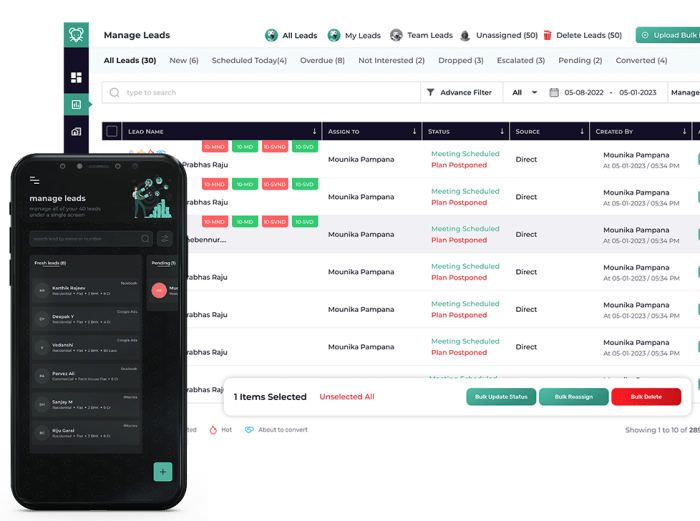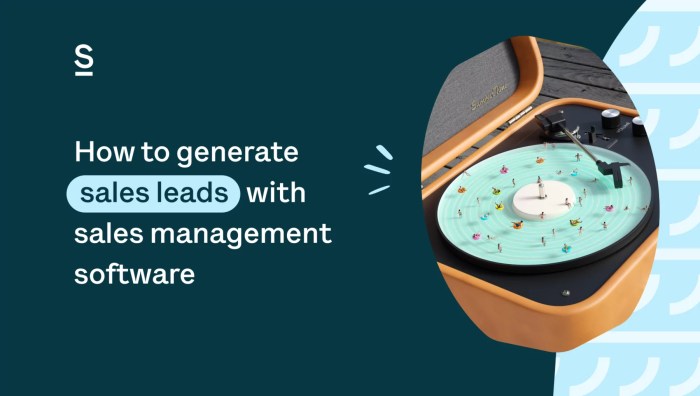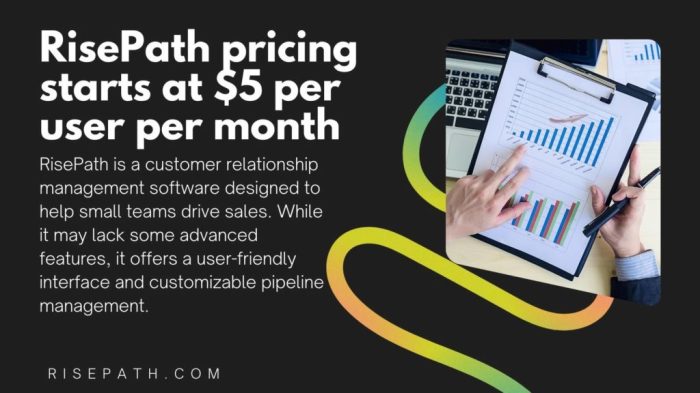Sales leads management software is revolutionizing how businesses nurture potential clients. Efficiently tracking, qualifying, and nurturing leads is crucial for sales growth, and the right software can significantly improve these processes. This technology offers a centralized system for managing all aspects of the sales pipeline, from initial contact to final conversion. By automating repetitive tasks and providing valuable insights into lead behavior, sales teams can focus their energy on building relationships and closing deals.
Features like lead scoring, automated email sequences, and detailed reporting capabilities empower sales professionals to personalize their outreach and optimize their sales strategies. The result is a more targeted, efficient, and ultimately more profitable sales process. Different software solutions cater to various business needs and sizes, offering scalability and flexibility for growth.
In today’s competitive business landscape, efficiently managing sales leads is paramount to success. The sheer volume of potential customers generated through various marketing channels can quickly become overwhelming without the right tools. This is where sales leads management software steps in, offering a centralized platform to organize, nurture, and convert leads into paying customers. This detailed guide explores the functionalities, benefits, and selection criteria for choosing the ideal sales leads management software for your business.
Understanding Sales Leads Management Software: More Than Just a CRM
While often conflated with Customer Relationship Management (CRM) software, sales leads management software possesses a more focused approach. While CRMs manage the entire customer lifecycle, lead management software prioritizes the crucial initial stages: lead capture, qualification, nurturing, and routing to the sales team. It streamlines the process, ensuring no potential opportunity slips through the cracks. Think of it as the engine driving the front end of your sales funnel.
Key Features of Effective Sales Leads Management Software:
- Lead Capture and Integration: Seamless integration with various marketing platforms (email marketing, social media, website forms) to automatically capture leads.
- Lead Scoring and Qualification: Automated scoring based on predefined criteria (demographics, website activity, engagement) to prioritize high-potential leads.
- Lead Routing and Assignment: Efficiently distributing leads to the appropriate sales representatives based on territory, expertise, or other factors.
- Lead Nurturing and Automation: Automated email sequences, personalized content, and targeted campaigns to engage and educate leads throughout the sales process.
- Reporting and Analytics: Comprehensive dashboards and reports to track key metrics (conversion rates, lead sources, sales cycle length) and measure ROI.
- Contact Management: Centralized database to store and manage all lead information, ensuring data consistency and accessibility.
- Workflow Automation: Automating repetitive tasks like email reminders, follow-ups, and data entry to free up sales team time.
- Sales Forecasting: Predicting future sales based on lead pipeline analysis and conversion rates.
- Integration with other business tools: Seamless integration with CRM systems, marketing automation platforms, and other business applications.
Benefits of Implementing Sales Leads Management Software
Investing in robust sales leads management software delivers a multitude of benefits, contributing significantly to improved sales performance and overall business growth. These include:
- Increased Lead Conversion Rates: By prioritizing high-potential leads and nurturing them effectively, conversion rates are significantly improved.
- Improved Sales Team Efficiency: Automation of repetitive tasks frees up sales representatives to focus on higher-value activities, such as building relationships and closing deals.
- Enhanced Lead Qualification: Automated lead scoring helps sales teams quickly identify and prioritize qualified leads, maximizing their time and resources.
- Better Lead Tracking and Reporting: Detailed analytics provide valuable insights into lead generation sources, conversion rates, and other key performance indicators (KPIs).
- Reduced Sales Cycle Length: Streamlined processes and automated follow-ups shorten the time it takes to convert leads into customers.
- Improved Customer Relationship Management (CRM): Many lead management systems integrate directly with CRMs, providing a holistic view of the customer journey.
- Increased Revenue and ROI: By optimizing the sales process and improving conversion rates, businesses experience significant revenue growth and a higher return on investment (ROI).
Choosing the Right Sales Leads Management Software: Key Considerations
Selecting the right software requires careful consideration of your specific business needs and priorities. Here are some key factors to evaluate:
- Scalability: Ensure the software can adapt to your growing business needs.
- Integration Capabilities: Check for compatibility with your existing CRM, marketing automation tools, and other business applications.
- User-Friendliness: The software should be intuitive and easy for your sales team to use.
- Pricing and Features: Balance cost with the features and functionalities you require.
- Customer Support: Reliable customer support is crucial for addressing any issues or questions.
- Security and Data Privacy: Ensure the software meets industry security standards and protects your sensitive customer data.
- Customization Options: Consider the ability to tailor the software to your specific workflows and processes.
Popular Sales Leads Management Software Options
The market offers a wide array of sales leads management software solutions, each with its own strengths and weaknesses. Researching and comparing different options is essential. Some popular choices include (but are not limited to): HubSpot, Salesforce Sales Cloud, Zoho CRM, Pipedrive, and Freshsales. Each platform offers varying features and pricing models, so thorough research is vital before making a decision.
Consider requesting demos and free trials to test the software before committing to a purchase.
Frequently Asked Questions (FAQ)
- Q: What is the difference between sales leads management software and CRM software?
A: While both manage customer data, lead management software focuses specifically on the initial stages of the sales process (lead capture, qualification, and nurturing), while CRM software manages the entire customer lifecycle. - Q: How much does sales leads management software cost?
A: Pricing varies widely depending on the features, scalability, and vendor. Options range from free plans with limited features to enterprise-level solutions with substantial monthly or annual fees. - Q: How can I measure the ROI of sales leads management software?
A: Track key metrics such as lead conversion rates, sales cycle length, and revenue generated. Compare these metrics before and after implementing the software to assess the impact on your bottom line. - Q: What are the best practices for using sales leads management software?
A: Establish clear lead qualification criteria, automate repetitive tasks, regularly analyze data and reports, and ensure consistent data entry and updates. - Q: Can I integrate sales leads management software with my existing marketing automation platform?
A: Many platforms offer integration capabilities with popular marketing automation tools, enabling seamless data flow and improved workflow efficiency. Check the specific integrations offered by the software you are considering.
References
Conclusion
Implementing effective sales leads management software is a strategic investment that can significantly boost your sales performance and overall business success. By streamlining your sales process, improving lead qualification, and automating repetitive tasks, you can unlock greater efficiency and achieve higher conversion rates. Take the time to research different options, carefully consider your business needs, and choose a solution that aligns with your goals.
The right software can be the key to unlocking your business’s full potential.
Call to Action: Sales Leads Management Software
Ready to transform your sales process and drive significant growth? Explore the leading sales leads management software options today and request a demo to see how it can benefit your business. Don’t let valuable leads slip through the cracks – take control of your sales pipeline and achieve your revenue goals.
In conclusion, leveraging sales leads management software is no longer a luxury but a necessity for businesses aiming for sustainable growth. By streamlining workflows, automating tasks, and providing data-driven insights, these tools empower sales teams to achieve higher conversion rates and build stronger client relationships. Investing in the right software can be a game-changer, transforming the sales process from a chaotic scramble to a well-oiled machine driving consistent revenue generation.

Source: leadrat.com
Key Questions Answered
What is the average cost of sales leads management software?
Costs vary widely depending on features, scalability, and vendor. Expect to find options ranging from free plans with limited functionality to enterprise-level solutions costing thousands per month.
How do I choose the right sales leads management software for my business?
Consider your business size, sales process, budget, and required features. Research different vendors, read reviews, and potentially try free trials to find the best fit.
Can sales leads management software integrate with my existing CRM?
Many solutions offer seamless integration with popular CRM platforms like Salesforce, HubSpot, and Zoho. Check the software’s compatibility before purchasing.

Source: surfe.com
How can I measure the ROI of sales leads management software?

Source: risepath.com
Track key metrics such as lead conversion rates, sales cycle length, and revenue generated. Compare these metrics before and after implementing the software to assess its impact.